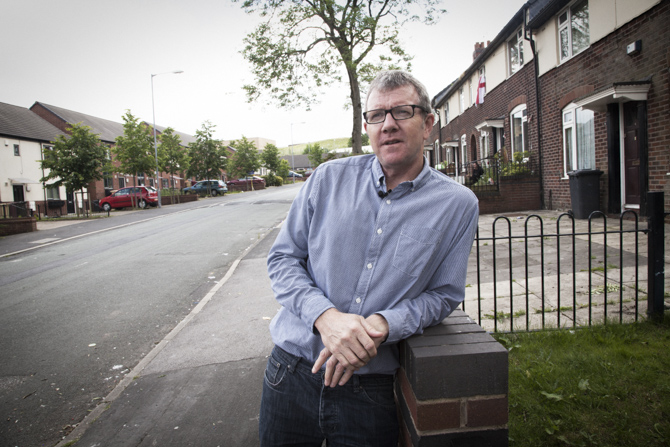Low level genius
…continued from Responding to need
I’m enjoying this: wandering around the estate with the neighbourhood manager whose Twitter strapline is ‘Changing Breightmet, one person at a time’.
As we head back we talk about what makes the UCANs work. We talk about the freedom the manager has to ‘do a piece of work’ as Vanessa would say, on anything they think needs special attention. And we talk about the blog, this blog, and how it has helped spread the word.
But when I take the recorder back from Tony I discover, to my horror, that it hasn’t recorded.
After sheepishly admitting my mistake, we sit in the UCAN’s back yard and do it all again. “Take two,” jokes Tony. “Now, are you sure it’s on this time?”
“Yep. I can see it going round. Tell me again about the characteristics of the UCAN. You said you had to have a defined neighbourhood to work in.”
“It only works if you focus on one area. I’ve always argued you could join with other housing providers to benefit the whole neighbourhood. That’s possible.”
“And what else?”
“You listen to what’s coming through the door and you work with partners – advice services, debt councillors, employment specialists – to meet those needs. Start with what the punters want and let that influence what you spend your money on. It’s simple but it rarely happens.”
“Do you think some organisations are almost afraid to actually talk to their residents?”
“Oh yeah. It takes a lot of courage to open the door and deal with whatever walks through. That’s why people have uniforms and desks to hide behind. UCANs never have reception desks.”
“And I remember the first time round you said that staff have to be passionate about what they do.”
“And non-judgmental. If there’s a ‘professional distance’ between you and the client they will never feel confident with you, never trust you. The barrier has to come down so the clients can get to know something about you, too. It’s really understated but it’s another vital part of the UCAN model. Without it, it wouldn’t work.”
Tony starts to draw a circle with his finger in the air. “How perfect is it for me, as neighbourhood manager, to have ongoing feedback from the community.” He’s on a roll now. “Right now I have a one-to-one relationship between need and budget and that’s as rare as rubies. Low level genius it is,” he laughs.
“And I know I’ve asked you this before, but why isn’t the UCAN model replicated everywhere if it’s so brilliant?”
“It’s not as if we are making a product that everyone can immediately see the benefit of. Ours is a simple idea but it’s been a hard sell.”
“And that has been frustrating for you?”
“Massively frustrating. Even within our own organisation. Some time ago, Bolton at Home made the UCANs fundamental to what we do as a housing association, and thank goodness we did.”
“But they’ve been recognised now, haven’t they?” The UCAN model was highly commended in the finals of a national housing award last week.
“They have, but it’s been difficult to explain which is why we commissioned you to do the blog.”
“Ah yes. First time round you said something about smoke and arse.”
Tony laughs. “I said I wasn’t going to blow smoke up your arse. I believe it’s an American expression.”
“I see.”
“It was the idea of using the blog to showcase our work through individual stories that reflected back on how fantastic the UCANs are. That’s what I wanted and you’ve delivered that in spades so I can’t thank you enough.”
“And thank you. And at the end of our first interview I asked you if there was anything else you wanted to say…”
“… and I delivered an impassioned speech for ten minutes which is now lost for ever. But don’t let that worry you Len.”

